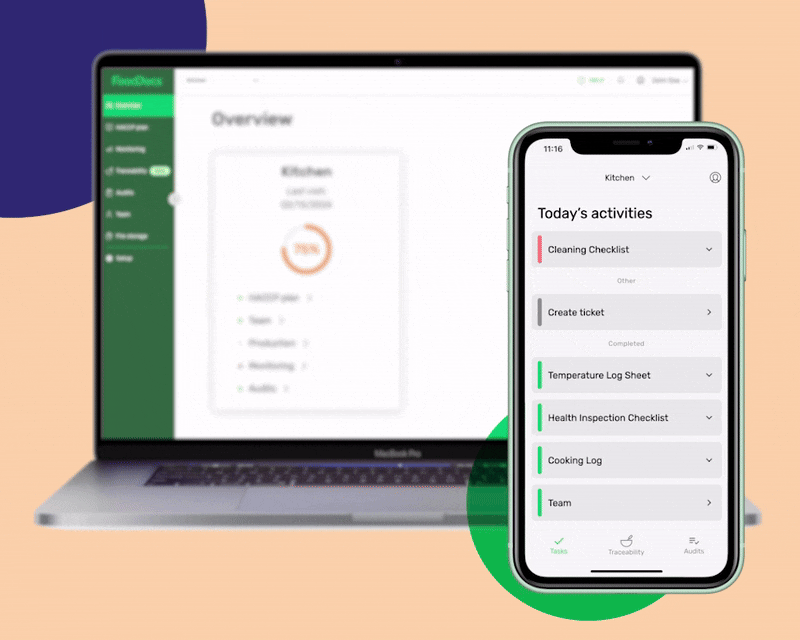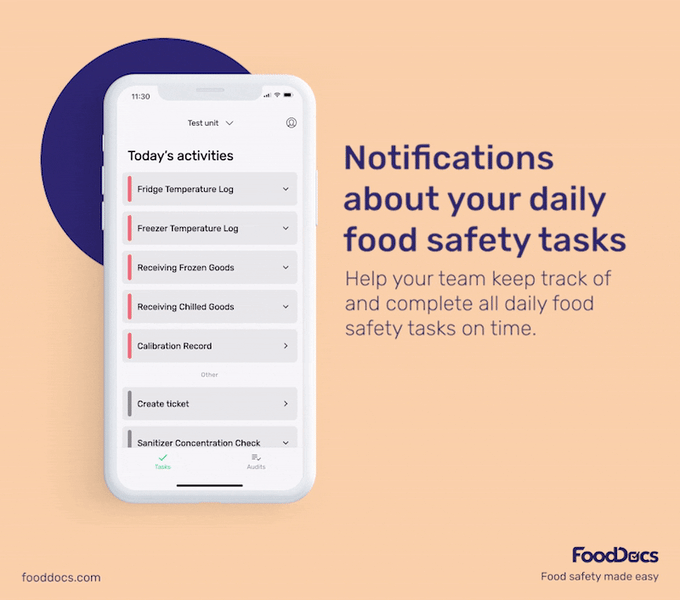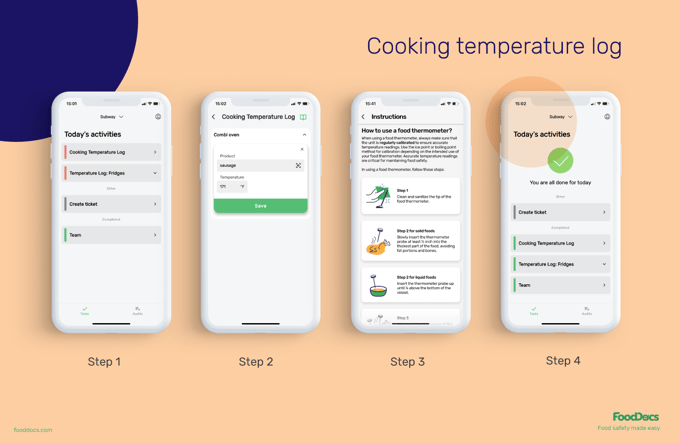Mastering Restaurant Sanitizing: Best Practices for Kitchens and Dining Areas
Master restaurant sanitizing with clear steps for kitchens and dining areas. Learn methods, checklists, and procedures to keep your team safe and...
WHAT WE'LL COVER:
A food safety manager is a professional responsible for ensuring the quality and safety of food products and processes in a food establishment.
They are mainly accountable for ensuring that the food business complies with food safety standards and regulations.
Food safety managers primarily oversee the implementation of proper food protection practices and aim to improve operational efficiency. Food safety managers can work in various settings, including food production, restaurants, food processing plants, catering companies, healthcare facilities, and retail food establishments.

A food manager is a trained food handler who is generally responsible for ensuring a smooth-flowing operation in any type of food business.
Depending on the size and nature of a food business, the responsibilities of a food manager may vary. Their tasks mainly revolve around ensuring quality and safety.
Here are the key responsibilities of a food manager:
While the responsibilities of a food manager are diverse, there are several innovative ways to improve efficiency while ensuring compliance with regulations. The best solution to this objective is to use FoodDocs' smart Food Safety Management System.
The terms "food protection manager" and "food safety manager" are interchangeable titles for a professional individual trained in managing food operations.
Unless otherwise required by a particular food law, the two terms mean the same thing. In some cases, food service establishments are required to have a certified Food Protection Manager on staff to oversee food safety practices and ensure compliance with local health and safety regulations.

A food safety manager certification process is a set of comprehensive training and examinations to help prepare an individual to manage a food business. The certification program aims to improve and demonstrate the individual's knowledge and competency in food safety practices.
Certification programs for managers are often more extensive than for attaining food handler licenses and permits.
The certification process commonly includes the following components:
A food manager certificate is awarded to a successful candidate who has passed the related examination. The certificate proves that this individual is competent in terms of managing food safety, training other food workers, and overseeing food operations.
The level of food safety certificates for a food manager greatly varies depending on the organization providing the certification program.
Some of the widely recognized food manager certification programs include the following:
Achieving one of these certifications demonstrates a deep understanding of food safety principles and regulatory compliance. Some locations offer free local health department certifications, which may be helpful to improve the skills of a food safety manager.
Depending on the certification program guidelines, the certification validity may require renewal. The most common timeframe for a certification renewal is every 2 to 3 years. This amount of time is enough to gather new information and make certification renewals efficient and up-to-date.
Aspiring food protection managers must undergo several steps, including training, to become credible and well-equipped to control food safety. This process also involves undergoing a food manager examination to evaluate their in-depth knowledge.

Additionally, ensure that you stay up-to-date with the latest food safety practices and regulations to maintain your certification status and continue to protect the safety of the food served in your establishment.
Ensure that you will get to apply all the food safety knowledge you get from these courses by implementing FoodDocs' smart Food Safety Management System.
With the help of our smart software, you can automatically get key monitoring tasks and checklists needed to ensure food safety compliance in your business. You can also get intuitive tools, such as a notification system that reminds food workers of tasks that need to be done.
Our smart solutions can help you ensure that you stay compliant while improving the efficiency of your operations.
Yes, food manager certifications typically require renewal. The renewal requirements for food manager certifications can vary depending on the specific certification program, your location, and local regulatory requirements.
Renewal processes are essential to ensure that a food safety manager stays up-to-date with the current food safety practices, regulations, and most recent developments in the food industry. This process will also help refresh initial knowledge about food safety.
The work of a food safety manager involves multi-tasking, not to mention that all these tasks involve different principles. Food managers play great roles in the safety and quality of food products and operations.
In addition, the responsibility of a food manager does not end with overseeing daily operations. As a food manager, you are also responsible for addressing any issues that may arise related to your products and services. These reasons are why a food protection or food safety manager must be well-equipped with the right knowledge and tools.

To help every food safety manager maintain compliance with food safety standards, use FoodDocs' smart Food Safety Management System.
As a food safety manager, one of your most significant tasks is to oversee the entire food business operation. This task is very hard to do, especially if you have to do things manually and you have to micromanage everything.
With the help of FoodDocs' intuitive Food Safety System, you can get a real-time dashboard that reflects your business's food safety status. You can use this feature to oversee completing all food safety tasks in your business.
In addition, this feature shows which tasks require more attention due to non-compliance. You can save time from reviewing each task and immediately address the problem.
Our software's real-time dashboard was made for food safety managers to improve managing efficiency while ensuring compliance with food safety tasks.
Managing a food safety team involves repeatedly reminding all food personnel about food safety tasks that need to be done. Using our smart software and tools, this tedious task does not have to be a problem anymore.
Our software features a smart notification system that sends intuitive alerts to food handlers whenever a task is due. With the help of this feature, all food safety tasks will be done on time and correctly.
The notification system also works as a reminder for renewing critical documents, including food safety manager certifications and food safety training programs. Once you enter the validity period of each certificate into our system, you will receive a notification reminding you to renew the documents before the due date.
Keep all documents and tasks up to date with the help of our smart notification system.

Share your food safety knowledge and train your team with the essential food safety tasks using our detailed instructions.
All automatically generated monitoring tasks from our system come with detailed step-by-step instructions on how to perform and monitor food safety tasks. You can use this to train existing employees or onboard new team members.
Save time by uploading your own version of the food safety instructions as images or videos and using them as references during your operations.
Ensure that all your team members perform each food safety task precisely according to your instructions.

Ensure compliance by evaluating in-house audit operations with the help of our smart auditing tools. Our intelligent software features an auditing feature where you can make checklists for conducting in-house inspections.
Upload pre-existing audit checklists or create new ones using our system and access them through any mobile device using our Food Safety App.
Use this feature to evaluate the status of your operations and establishment. Perform quarterly or yearly audits using our tools and use the information to improve your operations.
Our smart Food Safety Management System software was developed by food safety and technology experts to help make food safety compliance easier and more accessible. This innovation is the best partner for any food safety manager seeking to improve their food safety and operational efficiency.
With the help of our smart software, you can get a comprehensive food safety system in just 15 minutes. Using artificial intelligence, our software will build the system based on your business needs. What is even more exciting is that you can further tailor the system to your needs, as it is entirely customizable.
Switch to our smart and digital platform today and improve your operations right away.
To help you understand more about food safety management, here are a few of the most common questions asked regarding this topic:
Food safety managers often have degrees in food science, management, or other related courses. Despite this, anyone with proper and adequate training can become a food manager.
Different organizations offer online food safety accredited courses, particularly designed to equip individuals to handle food employees and operations.
A manager of food safety is a trained professional responsible for overseeing the implementation of food safety regulations in a food business. Food safety managers oversee any task related to ensuring food safety.
The manager's most important food safety responsibility is to prevent foodborne illnesses by implementing and enforcing proper food handling, storage, and sanitation practices. This includes training staff, monitoring food preparation processes, and maintaining a clean environment.
In a food business, the responsibility for food safety management is shared between the food safety management team and the business owner. Depending on the organizational structure of a food business, these departments can be combined.
Master restaurant sanitizing with clear steps for kitchens and dining areas. Learn methods, checklists, and procedures to keep your team safe and...
Learn challenges healthcare foodservice teams face today and key food safety practices to protect vulnerable patients. Get a free healthcare leader...
Learn what Standard Operating Procedures (SOPs) are and how to write effective SOPs that ensure consistency, efficiency, and safety in your...